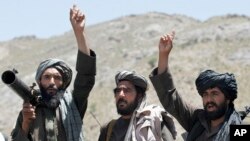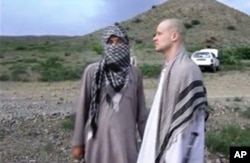Five senior Afghan Taliban leaders, who were swapped for the freedom of an American hostage in 2014, have been “re-activated” and made part of the Islamist insurgency’s Qatar-based "political office" holding peace talks with the United States.
Taliban spokesman Zabihullah Mujahid told VOA on Tuesday the men formally assumed the role of “political negotiators” the previous day at a ceremony in its office in Doha, the capital of the Gulf state. “They have rested enough and practically resumed service (to the Taliban),” he added.
The United States released them from its Guantanamo detention center to authorities in Qatar in June 2014, in exchange for Sgt. Bowe Bergdahl, the only American soldier taken prisoner by the Taliban in Afghanistan.
Mullah Fazal Muhammad, former Taliban army chief, and Mullah Abdul Haq, former spy chief, are among the group of five insurgent leaders.
The induction of the five senior Taliban members in its political office follows two known rounds of direct talks Washington has held with the insurgent group in Qatar since late July in a bid to seek a negotiated end to the Afghan war. Newly appointed U.S. envoy for Afghanistan reconciliation, Zalmay Khalilzad, led the latest meeting with the Taliban in Doha earlier this month.
“The fact that these persons have become active again will certainly have a big impact,” Mujahid told VOA when asked whether the new appointments would help further the nascent peace dialogue with the U.S.
There was no immediate reaction available from Washington to the Taliban's move nor have authorities in Qatar commented on it.
The Qatari government, under the deal that led to the release of Taliban commanders four years ago, was bound until now to prevent the former Guantanamo prisoners from leaving the country or participating in any political activity related to the insurgency.
Analysts say U.S. tacit approval might have played a role in allowing the senior insurgent officials to join the nascent political dialogue process.
Adam Weinstein, a veteran of the U.S. Marine Corps who served in Afghanistan, says the tentative U.S.-Taliban dialogue could pave the ground for securing a political solution to the conflict.
“I am not in the room so I don't known what terms are being discussed. But if the U.S. is serious, Pakistan is serious and the Taliban are serious, and the Afghan government is serious, I think there is a possibility,” Weinstein told VOA. He currently is in Islamabad delivering public talks on regional security issues.
“The Taliban certainly have a decent amount of leverage right now. They have regained significant territories. Virtually every district that my task force took from the Taliban is now back in the Taliban’s hands. So, they are negotiating from a position of strength,” noted Weinstein.
Last week, neighboring Pakistan also set free the former deputy supreme leader of the Afghan Taliban, Mullah Abdul Ghani Baradar, along with another senior member of the insurgency who had spent years in custody.
It was not clear whether Bradar's release had anything to do with the Qatar peace process talks.
“Mullah Bradar and Mullah Samad Sani were released by Pakistan in line with its commitment to facilitate peace process in Afghanistan.. We remain committed to an Afghan-led and Afghan-owned peace and reconciliation process,” an official Pakistani statement said.





